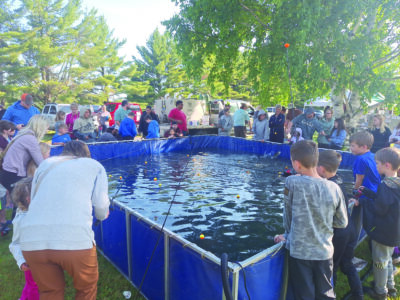Cooked to perfection at Horizons

(Image provided by Shelli Kargela) A cooking class offered as an elective to students at the Horizons Alternative High School in Calumet gives students the ability to learn to cook healthy meals from well-sourced ingredients.
CALUMET — Students at Horizons Alternative High School in Calumet take the same core classes that they would at any other school. However, the educators and administrators often attempt to offer additional courses to help the students become well-rounded and offer them experiences that they might not otherwise have. Among these is a relatively new cooking and health course offered by community volunteers.
The class was started in the spring semester of 2018 by Kathleen Harter and Shelli Kargela after successfully pitching the idea to the administration. The class is a collaboration between the school, these volunteers, and a number of other area resources and organizations.
“31 Backpacks paid for the food, and I’d buy it at the [Keweenaw] Coop,” said Kargela.
31 Backpacks is an area non-profit that helps to provide food assistance to families when their children are home from school. Many students from large or low-income families receive reduced-price lunches during the school year, meaning that feeding them healthy meals when they are at home can be more difficult for their families.
The Keweenaw Coop in Hancock sells healthier food options than most other area grocery stores, including organic and locally sourced produce. They also regularly help area organizations, including 31 Backpacks through initiatives like their recent Round Up at the Register campaign.
“There have been a couple of times that the students have helped me shop for the ingredients,” said Kargela. “I believe it’s made an impact on them becoming more aware of their relationships with food.”
A barrier to healthy diets for adults as well as children is the misconception that eating healthier food is more expensive. Because prepared foods are in one package, they seem less expensive than buying separate ingredients despite the fact that buying the separate ingredients would produce more food at less cost. More prepared foods also tend to have a lower nutritional value than foods prepared from fresh ingredients.
“I do my best to educate them on healthy choices because I see what they eat,” said Kargela. “Some of them have never cooked an egg.”
The class is offered one day each week and counts toward elective credits. However, students have other opportunities related to the class as well, including using their skills to prepare breakfast for the rest of the school – an event which usually happens about once each semester.
“I do encourage the students, if they can get there early, to help me cook the foods,” Kargela said of the special breakfasts. “The students who have participated have really enjoyed it.”
Kargela said that, in addition to the lessons that they take away, learning to cook their own food from scratch gives the students a sense of accomplishment. She regularly sees students in the hallway or in the community who tell her that they used the skills they learned in her class to cook for their families. One graduate who took the course in high school now works in food preparation in a popular area restaurant.
“They maybe haven’t come from the most supportive environments. I think [the class] goes beyond cooking to just being there and listening,” said Kargela. “I love connecting with students and seeing them out in the community … It’s building those relationships that I love.”
Kargela says that she plans to continue the program, and potentially expand it to include other areas of wellness with the support of other community organizations.





